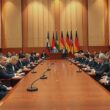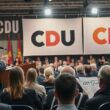Leaders from Germany, France and Poland convened in Chisinau, Moldova, on Wednesday to mark the nation’s Independence Day. German Chancellor Friedrich Merz, French President Emmanuel Macron and Polish Prime Minister Donald Tusk’s visit comes ahead of parliamentary elections scheduled for September 28th and is widely interpreted as a show of support for Moldova’s pro-European President Maia Sandu.
Speaking at a joint press conference, Chancellor Merz emphasized the significance of Moldova’s chosen path. “We are celebrating the fact that the people of Moldova and the country itself have embarked on a path towards the European Union, determined by themselves” he stated. He drew a parallel with the ongoing conflict in Ukraine, highlighting the fragility of self-determination.
Merz articulated two key messages from the visiting delegation. “The first is that the door to the European Union is open. You are wholeheartedly welcome in this European Union” he explained, adding that Moldova is an integral part of the European family both geographically and historically.
The second message, he continued, is one of support for Moldova’s sovereignty. He acknowledged the increasing pressure facing the nation, particularly in the lead-up to the elections with what he characterized as “massive hybrid attacks” originating from Russia. “Moldovan democracy is in the crosshairs, both online and offline, as is a free and open liberal society” he said. He affirmed Germany and Europe’s commitment to bolstering Moldova’s security forces and countering disinformation and cyber campaigns.
President Macron echoed these sentiments, stressing the importance of promoting democracy at a time when international law is being challenged and borders questioned. He contrasted the European Union’s approach with that of Russia, asserting that the EU does not pose a threat to any nation and respects the sovereignty of all countries, stating that accession is a voluntary decision.
Macron also commended Moldova’s progress in implementing reforms necessary for potential EU membership, noting that these efforts had resulted in the European Commission and member states approving initial payments of a €1.9 billion growth plan for the country.





